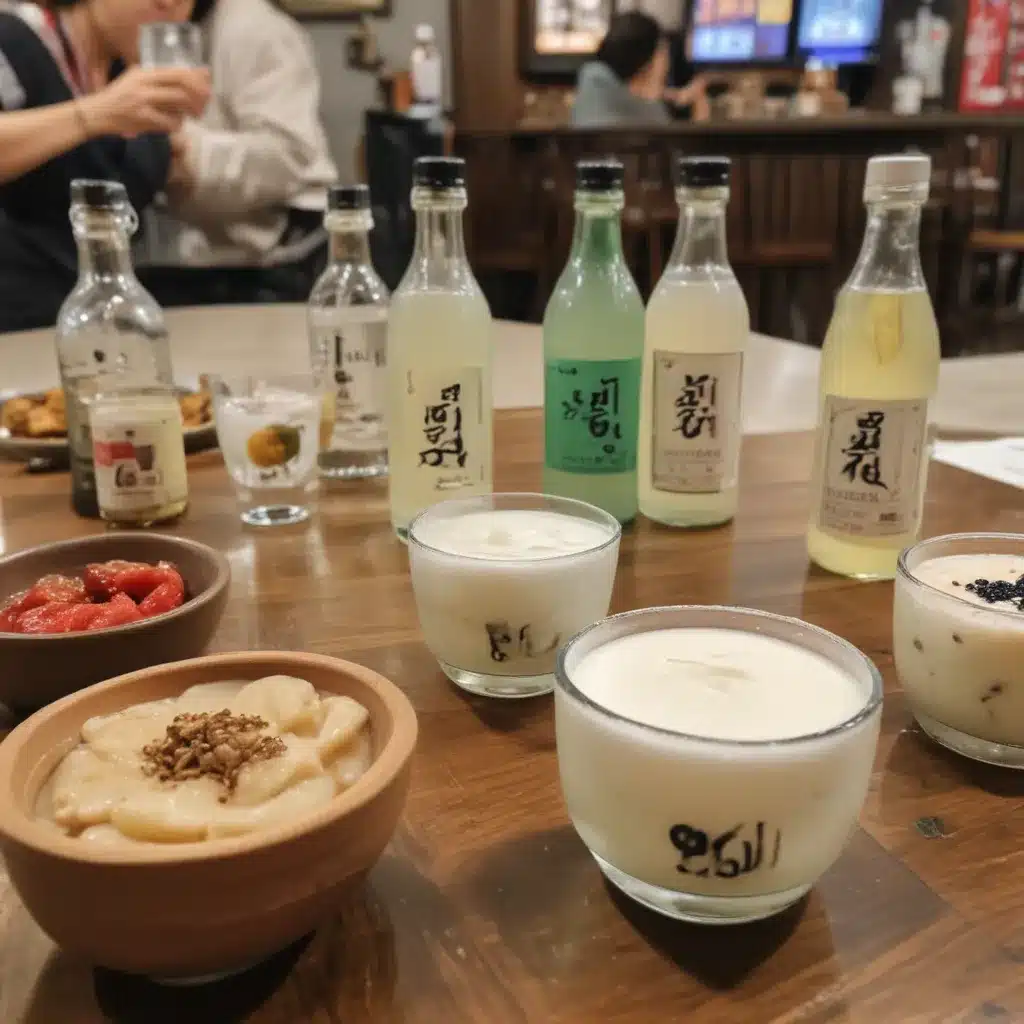
Unraveling the Complexity of Korean Drinks
As a self-proclaimed connoisseur of all things Korean, I’ve long been fascinated by the rich and diverse world of Korean beverages. From the crisp, effervescent maekju (beer) to the smooth, potent soju, and the cloudy, slightly sweet makgeolli, these drinks have captured my heart and taste buds. And let me tell you, navigating the vibrant Korean drinking scene in Boston has been quite the adventure.
You see, I’m the type of person who’s always eager to uncover the stories behind the flavors. What are the cultural traditions and histories that have shaped these beverages? How do they fit into the fabric of Korean society? And most importantly, where can I find the best versions of them in this bustling city?
Well, buckle up, because I’m about to take you on a journey through the world of Korean drinks in Boston. We’ll dive deep into the unique characteristics of each, explore the local establishments that are keeping these traditions alive, and maybe even indulge in a tasting or two along the way. After all, what’s the point of learning about these captivating libations if you can’t enjoy them firsthand?
Maekju: The Beloved Korean Beer
Let’s start with the quintessential Korean beverage – maekju, or Korean beer. Now, I know what you’re thinking: “Beer? How exciting can that be?” But trust me, my friends, Korean beer is a whole different ballgame.
For starters, the history of maekju is deeply rooted in Korean culture, dating back centuries. The earliest known records of beer production in the Korean peninsula can be traced to the Goguryeo kingdom, which existed from the 37 BC to 668 AD. Imagine that – people were enjoying a cold one while the Roman Empire was still in its prime. And over the centuries, the brewing techniques and flavor profiles have evolved, reflecting the country’s unique culinary traditions.
But it’s not just the history that makes Korean beer so captivating. The flavors are simply out of this world. Unlike the light, crisp lagers that dominate the American beer scene, maekju tends to be a bit heartier, with a fuller body and a touch of sweetness. It’s the perfect accompaniment to the bold, savory dishes that Korean cuisine is renowned for.
And let me tell you, Boston is no stranger to the joys of Korean beer. In fact, there are several local establishments that have become havens for maekju enthusiasts. Take, for instance, Korean Garden Boston, a beloved Korean restaurant that boasts an impressive selection of Korean beers on tap. I’ve spent many a night there, sampling the different varieties and marveling at how each one seems to perfectly complement the flavors of the kimchi, bulgogi, and other Korean delicacies on the menu.
But maekju is more than just a drink – it’s a social experience. In Korea, gathering with friends and family over a round of beers is a time-honored tradition, a way to bond, laugh, and share stories. And that tradition lives on in Boston, where Korean immigrants and enthusiasts alike come together to indulge in the rich, complex flavors of maekju.
Soju: The Ubiquitous Korean Liquor
If maekju is the heart of Korean drinking culture, then soju is undoubtedly its soul. This clear, distilled liquor has been a staple in Korean households and gatherings for centuries, and its influence on the local drinking scene in Boston is undeniable.
Now, I know what you’re thinking: “Soju? Isn’t that just the cheap, high-alcohol Korean vodka?” Well, my friend, that’s a common misconception. While soju may have a higher alcohol content than your average spirit, it’s a far more nuanced and complex beverage than you might expect.
You see, the history of soju is as rich and varied as the drink itself. Originating in the Andong region of Korea, soju has undergone countless iterations and refinements over the years, with each distillery and region putting its own unique spin on the recipe. Some soju is made from rice, while others use different grains like wheat or barley. And the distillation process can also vary, resulting in subtle differences in flavor and texture.
But what really sets soju apart is its ability to complement the diverse flavors of Korean cuisine. Whether you’re pairing it with spicy tteokbokki, savory bulgogi, or even the sweeter flavors of Korean fried chicken, soju has a way of seamlessly blending in and enhancing the overall dining experience.
And let me tell you, the soju scene in Boston is thriving. There are countless Korean restaurants and bars that pride themselves on their soju selection, each offering a unique twist on this storied liquor. Take, for instance, the iconic Eunbar in Allston, a cozy Korean pub that boasts an impressive array of soju varieties, each with its own distinct personality.
But soju isn’t just about the drinks – it’s about the experience. In Korea, soju is often shared among friends and family, with each person pouring for the other as a gesture of camaraderie and respect. And that tradition has carried over to the Boston drinking scene, where I’ve had the pleasure of participating in countless soju-fueled gatherings, filled with laughter, stories, and the occasional bout of karaoke.
Makgeolli: The Rustic Charm of Korean Rice Wine
Now, if maekju and soju are the well-known heavyweights of the Korean beverage world, then makgeolli is the unsung hero – the underdog that deserves far more attention than it often receives.
Makgeolli, a milky, slightly fizzy rice wine, is a true embodiment of the rustic, earthy charm of Korean cuisine. Unlike the crisp, effervescent maekju or the smooth, potent soju, makgeolli has a unique texture and flavor profile that sets it apart. It’s slightly sweet, with a subtle tartness that comes from the fermentation process, and it has a creamy, almost silky mouthfeel that’s truly one-of-a-kind.
But the story of makgeolli is not just about the drink itself – it’s about the rich cultural traditions that have shaped its evolution over the centuries. Makgeolli has its roots in the agrarian communities of ancient Korea, where it was often enjoyed by farmers and laborers as a refreshing, nourishing beverage after a long day’s work.
And let me tell you, the makgeolli scene in Boston is just as fascinating as its history. There are a handful of local establishments that have dedicated themselves to preserving the art of makgeolli-making, each putting their own unique spin on this traditional drink.
Take, for instance, the Makgeolli Makers, a small, family-owned operation in Somerville that specializes in crafting artisanal makgeolli using traditional methods and locally sourced ingredients. I had the privilege of visiting their humble operation, and let me tell you, the passion and care they pour into each batch is truly awe-inspiring.
But it’s not just the makgeolli itself that captivates me – it’s the entire experience of enjoying it. In Korea, makgeolli is often served in communal dishes, with friends and family gathering around to share the experience. And that tradition has carried over to Boston, where I’ve had the pleasure of participating in makgeolli-fueled gatherings, complete with traditional Korean snacks and lively conversations.
Embracing the Diversity of Korean Drinks in Boston
As I reflect on my journey through the world of Korean beverages in Boston, I’m struck by the sheer diversity and richness of these drinks. From the crisp, effervescent maekju to the smooth, potent soju, and the cloudy, slightly sweet makgeolli, each one offers a unique window into the cultural traditions and culinary heritage of Korea.
And the best part? The local drinking scene in Boston is thriving, with a growing number of establishments dedicated to preserving and celebrating these time-honored traditions. Whether it’s the bustling Korean restaurants that offer a tantalizing array of maekju options or the cozy, hole-in-the-wall bars that specialize in artisanal makgeolli, there’s no shortage of opportunities to immerse yourself in the world of Korean drinks.
So, if you’re like me – someone who’s fascinated by the rich tapestry of global cultures and cuisines – I encourage you to embark on your own journey of discovery. Venture out and explore the Korean beverage scene in Boston, one sip at a time. Who knows, you might just find your new favorite drink – and maybe even make a few new friends along the way.
